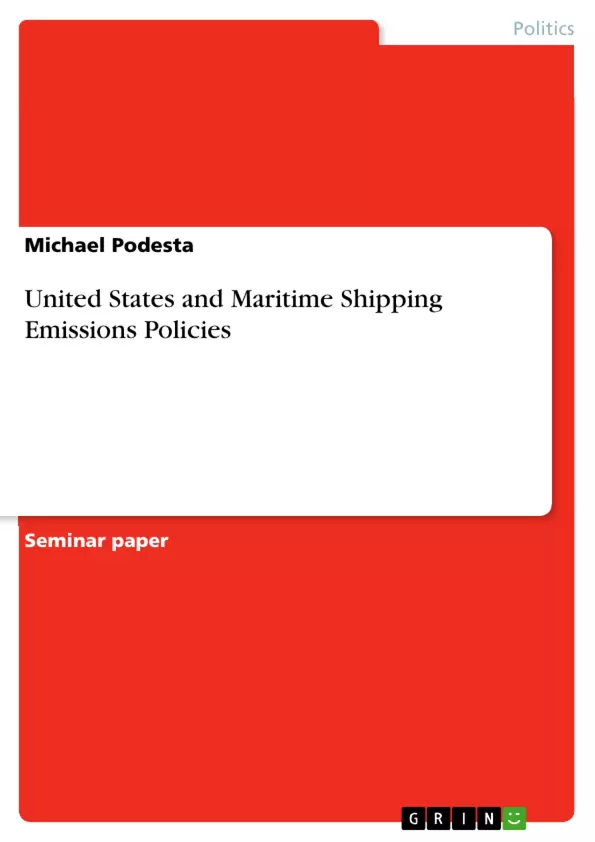The maritime freight industry is a major contributor to global greenhouse gas emissions. If current practices continue, experts predict that it will account for 17% of total emissions by 2050. Both the United States government and the International Maritime Organization have enacted strict regulations to promote the industry’s adoption of alternative sources of fuel in an effort to reduce the amount of sulfur oxides and other pollutants released from container ships. This research sought to connect whether or not the United States and International Maritime Organization sulfur fuel enforcements have allowed container ship companies to catalyze an industry-wide shift in shipping practices.
To answer my questions, I analyzed relevant container ship policies by the United States government within the last ten years as well as regulations in place by the International Maritime Organization specifically addressing sulfur level reduction. I then analyzed the archives of container ship companies in search of sustainability initiatives or alternative fuel adoption underway.
In gathering results, I found evidence suggesting the United States federal government has enacted sufficient standards in attempting to limit sulfur emissions from container ship engines within its coastlines. Additionally, I recognized that the International Maritime Organization is committed to reducing sulfur emissions in the fastest way possible by establishing Emission Control Areas in coastlines as well as instituting tight regulations to limit sulfur content in ship fuel. Third, reports show that the industry is struggling to adopt clean fuel, due to high market costs and demand, but have been able to meet the fuel standards through alternative and cheaper methods.
These results are applicable to only container ships or vessels of that size, as smaller vessels have different engine standards. Moreover, this research was concerned specifically with North American standards, meaning that the same results may not be found in other areas of the world. The research I conducted serves as insight for the public into a relatively unknown aspect of transportation-related environmental issues. It also functions as a platform upon which the dangers of human-caused climate change can be addressed.
Inhaltsverzeichnis (Table of Contents)
- ABSTRACT
- INTRODUCTION
- LITERATURE REVIEW
- UNITED STATES ACTIONS TO COMBAT SULFUR EMISSIONS
- INTERNATIONAL MARITIME ORGANIZATION
- INDUSTRY REACTION
- CONCLUSION
Zielsetzung und Themenschwerpunkte (Objectives and Key Themes)
This report examines the effectiveness of the United States government's initiatives to reduce sulfur oxide and nitrogen oxide emissions from container ships, in conjunction with international standards on global shipping. It aims to discuss how container ship companies can operate in an environmentally conscious manner while maintaining economic success.
- The impact of US and international regulations on sulfur emissions from container ships
- The economic challenges faced by container ship companies in adopting clean fuel
- The effectiveness of environmental standards in addressing emissions from container ship exhausts
- The long-term impact of international agreements reducing sulfur emissions
- The methods container ship companies are adopting to comply with global emission standards
Zusammenfassung der Kapitel (Chapter Summaries)
- ABSTRACT: This chapter introduces the research question: whether US and International Maritime Organization sulfur fuel enforcements have catalyzed an industry-wide shift in shipping practices. It summarizes the research methodology and key findings, highlighting the effectiveness of US and IMO regulations in reducing sulfur emissions from container ships.
- INTRODUCTION: This chapter provides context for the research by discussing the environmental impact of the maritime freight shipping industry. It highlights the need for sustainable practices and the challenges faced by container ship companies in meeting new emission standards.
- LITERATURE REVIEW: This chapter reviews existing research on sulfur emissions from container ships, focusing on the effectiveness of US regulations and the economic costs associated with ship-caused air emissions. It cites relevant studies and reports, including a NOAA study on the impact of low-sulfur bunker fuel on emissions and an article by Kevin Gallagher on the economic cost of sulfur oxide emissions.
Schlüsselwörter (Keywords)
This report focuses on the environmental impact of the maritime freight shipping industry, specifically addressing sulfur emissions from container ships. Key terms and concepts include: container ships, sulfur oxides, nitrogen oxides, greenhouse gas emissions, heavy fuel oil, clean fuel, emission control areas, International Maritime Organization (IMO), United States government regulations, sustainability initiatives, and economic impact.
Frequently Asked Questions
How much will maritime shipping contribute to global emissions by 2050?
Experts predict that if current practices continue, the maritime freight industry will account for 17% of total global greenhouse gas emissions by 2050.
What is the role of the International Maritime Organization (IMO) in reducing emissions?
The IMO institutes regulations to limit sulfur content in ship fuel and establishes Emission Control Areas (ECAs) along coastlines to reduce pollutants.
Are shipping companies successfully adopting clean fuels?
While the industry struggles with high market costs for clean fuel, many companies have met standards through alternative and more cost-effective methods.
What are Emission Control Areas (ECAs)?
ECAs are specific sea areas where stricter controls are established to minimize airborne emissions from ships, as mandated by the IMO.
Does this research apply to all types of maritime vessels?
No, the results specifically apply to container ships or vessels of similar size, as smaller vessels are subject to different engine standards.
- Quote paper
- Michael Podesta (Author), 2016, United States and Maritime Shipping Emissions Policies, Munich, GRIN Verlag, https://www.grin.com/document/352042



